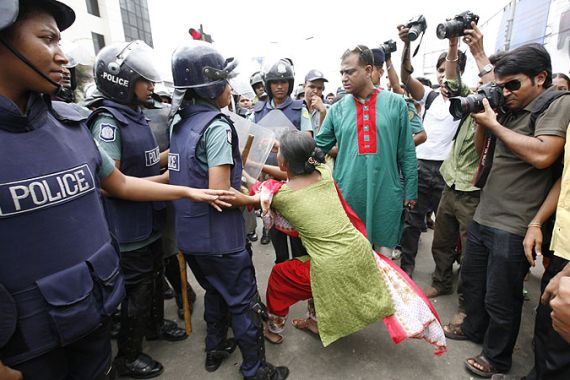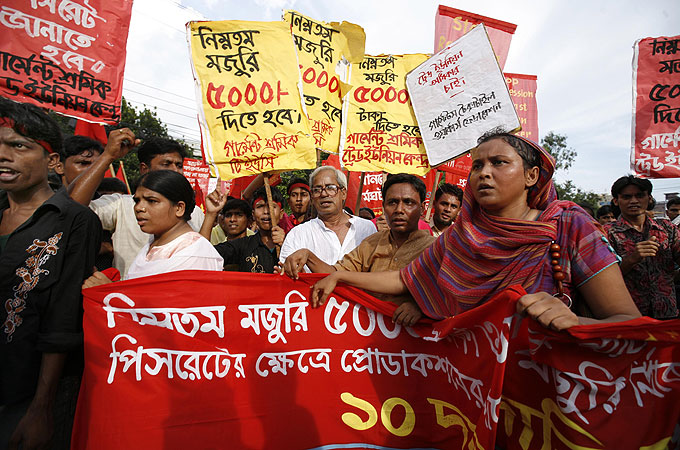Deadly wage protests in Bangladesh
At least three people killed as thousands of garment workers clash with police during demonstrations over low wages.

 |
| Garment workers have been continuously demanding the implementation of a new monthly minimum wage [EPA] |
A protest over low wages in Bangladesh’s garment industry has left at least three people dead and dozens of others injured in clashes with police in several major cities including the capital, Dhaka.
The garment workers, who make clothes for many popular Western brands, were angered over a delay in the implementation of a government rise in wages due last month.
Keep reading
list of 4 itemsA flash flood and a quiet sale highlight India’s Sikkim’s hydro problems
Why is Germany maintaining economic ties with China?
Behind India’s Manipur conflict: A tale of drugs, armed groups and politics
The revised pay structure took effect in November, but workers say many factories have not yet implemented the measure, which has led to continuing protests in recent months.
The new wage of at least $45 a month represents an 80 per cent increase on the existing minimum wage, and is the first since 2006.
Reza Al Hasan, a police official, said tear gas and rubber bullets were fired into the crowd during the demonstrations after thousands of workers attacked factories and smashed vehicles at the Chittagong Export Processing Zone on Sunday.
In Dhaka, about 4,000 mainly female workers torched two vehicles and blocked a main road in protest against employers, accusing them of not implementing the wage increase.
Clashes were also reported in the city of Chittagong, to Dhaka’s southeast, and Rupganj in the northeast.
Deadly protests
“Three people have died, including a rickshaw driver who died on the spot after he was hit by a brick,” Meshbahuddin, the special branch police chief in Chittagong, told the AFP news agency.
He said about 50 people had been injured at the zone, where 20,000 workers attacked factories and a police station.
Kusum Dewan, another senior police official, said batons were first used in an attempt to disperse the stone-throwing workers in the zone, but failed to control them.
The zone houses about 70 foreign companies that mainly manufacture garments, shoes and bicycles, and employ about 150,000 workers.
In Rupganj, about 5,000 workers attacked a German joint-venture garment factory, said Biswas Afzal Hossain, the district police chief.
He said tear gas and rubber bullets were used to break up the protests.
Officials said Sunday’s clashes also involved Youngone, a South Korean company and Bangladesh’s largest exporter, which suspended operations at its 13 garment factories late on Saturday after workers attacked the facilities.
‘Unruly workers’
Shikdar Mesbahuddin Ahmed, a director with Youngone, told AFP that its wages are already higher than the new government minimum but it was “devising ways to compensate senior workers who felt deprived by the new rates”.
“They became unruly and didn’t wait for our decision. Our deputy director is seriously injured. He will be flown to Bangkok for treatment,” Ahmed said, adding the company employed 36,000 workers in Bangladesh.
Many of the country’s 4,500 garment factories produce clothes for big names such as Wal-Mart, Zara, Tommy Hilfiger, H&M, Carrefour, Gap, Metro, JCPenney, Marks & Spencer, Kohl’s and Levi Strauss.
Garments accounted for 80 per cent of the country’s $16.2bn in annual exports last year, mainly to the US and Europe.
Bangladesh’s factories employ more than three million workers, about 85 per cent of them women.